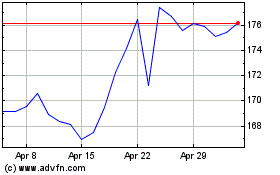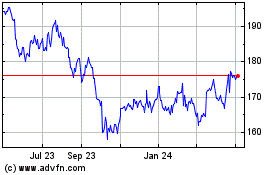By Alex Leary
WASHINGTON -- At a June 2016 Business Roundtable meeting of 100
of the nation's top executives, a speaker asked for a show of hands
from those who had dealt with Donald Trump, who would officially
become the Republican presidential nominee the following month. Not
a single hand was raised.
Today, nearly two years after Mr. Trump took office, the
business community is still trying to figure out how to work with
the businessman-turned-president. Progress is being made, in fits
and starts.
Chief executive officers early on were eager to join various
councils created by the White House -- a head-on approach that
collapsed after Mr. Trump's controversial response to a
white-supremacist rally in Charlottesville, Va., last year that
resulted in the death of a peaceful counterprotester.
Since then, individual companies and trade groups have employed
a mix of quiet diplomacy and occasional splashy displays of support
to create an alliance that has produced broad regulatory rollbacks
and curbs on new rule making, as well as the biggest one-time drop
in the corporate tax rate, now the lowest since 1939. Those gains
have come against the backdrop of a booming economy and stock
market, though the latter has wobbled in recent months.
That alliance, however, is being tested anew with Mr. Trump's
provocative moves on trade, tariffs and immigration.
"The uncertainty is terrible," says Carlos Gutierrez, former CEO
of Kellogg Co. and commerce secretary under President George W.
Bush. "Sure, we need to have serious discussion with China, but do
we need to get in a trade war that is going to impact U.S.
companies and consumers?" CEOs, he says, "are on the edge."
Jeffrey Sonnenfeld, a Yale School of Management professor who
conducts regular CEO surveys, sums up the business leaders'
political journey this way: "In the course of two years, CEOs have
moved from skepticism, to fearful concern, to cautious optimism, to
widespread enthusiasm, to disappointment, to guarded fear with
lingering targeted hope."
Fresh whiplash came last week when General Motors Co. said it
would end production at several U.S. factories next year. CEO Mary
Barra, once a member of a presidential advisory council, took the
news directly to Mr. Trump a day before the news became public. The
next day, she attributed the move to shifting consumer taste and a
bet on electric and self-driving vehicles. GM's stock jumped.
But Mr. Trump lashed out, telling The Wall Street Journal that
GM "better damn well open a new plant" in Ohio -- a crucial
election battleground -- and stop making vehicles in China. The
flogging continued the next day, with Mr. Trump threatening on
Twitter to cut off electric-vehicle and other subsidies. This time,
GM's shares fell.
A promising start
At first, CEOs discovered an ally in President Trump, who in
meetings with executives made personal requests for lists of
problem regulations and solicited advice on policies. He charmed
guests with impromptu invitations to visit the Oval Office.
During a meeting in February 2017, Mr. Trump turned to David
Farr, CEO of Emerson Electric Co., and asked him to come up with a
list of regulations the industry found onerous. Within a month, the
National Association of Manufacturers, which Mr. Farr chairs,
submitted a 42-page report.
"That's what most Americans don't get to see, how great our
president is at listening. He's dealing with innumerable issues and
crises and truly values input of U.S. business leaders," Harold
Hamm, chief executive of shale-oil producer Continental Resources
Inc., said last month. "I was drawn to Mr. Trump much like the rest
of the American people. He was not a politician seeking to advance
his career, but rather a businessman who was more interested in
solutions than the political norm."
But the unconventional aspect of his presidency quickly cut both
ways. Mr. Trump's freewheeling Twitter feed, for example, has
complicated relations. In December 2016, before being sworn in, Mr.
Trump shocked Boeing Co. with a complaint about the cost of a
replacement Air Force One, tweeting "Cancel order!"
Meanwhile, CEOs who have publicly praised the president, such as
Under Armour Inc.'s Kevin Plank, stepped into a minefield of
polarized consumer reaction. Mr. Plank called Mr. Trump a "real
asset" to business, amid an uproar over the president's attempts to
impose a targeted travel ban. The company faced boycott calls and
rebukes from customers and its contract athletes. A year later,
after Charlottesville, Mr. Plank was the second executive to resign
from the president's American Manufacturing Council -- eliciting a
new wave of calls for boycotts, this time from Trump
supporters.
Business leaders soon decided that new tactics were needed.
Boeing CEO Dennis Muilenburg called up Mr. Trump almost
immediately after the Air Force One tweet and sought a face-to-face
meeting. Amid negotiations over the price, Mr. Muilenburg explained
how government security requirements drove the costs, but also
publicly flattered the president as a "tough negotiator" and "a
good businessman."
He opened Boeing's doors for Mr. Trump, throwing a
campaign-style event in February 2017 in South Carolina in which
workers held signs touting American jobs, and he continued to
attend the president's industry roundtables on national-security
matters.
That has afforded Mr. Muilenburg room to pursue other issues --
he played a role in the president's reversal of a campaign pledge
to kill the Export-Import Bank. Mr. Trump's posture toward China, a
rapidly growing market for Boeing, remains problematic for the
company, but Mr. Muilenburg has maintained a positive profile,
extolling the value of a "seat at the table."
Lockheed Martin Corp. CEO Marillyn Hewson has been similarly
nimble, saying she welcomed a discussion about the F-35 fighter-jet
program costs after Mr. Trump complained about them. She has joined
with the White House on attempts to crack down on Chinese theft of
intellectual property. This summer, when the White House held a
showcase of American-made products, Lockheed delivered an F-35 and
an Orion spacecraft to the South Lawn.
"She's tough," the president has said of Ms. Hewson. Mr. Trump
the critic has since become the salesman, helping curry favor for
the F-35 program on Capitol Hill, where costs have been a
bipartisan issue for years. In November, Lockheed was awarded a
contract worth up to $23 billion from the Defense Department to
deliver 255 F-35 jets.
Worker prep
Ms. Hewson has also ensured a role for Lockheed in the White
House's focus on workforce development, pledging millions of
dollars for vocational and trade programs. Businesses are
increasingly concerned about a lack of skilled employees, and
dozens of companies, from Amazon.com Inc. to FedEx Corp. and
Raytheon Co., have been eager participants in the push, spearheaded
by Mr. Trump's daughter, Ivanka. Similarly, many companies joined
efforts to combat the opioid crisis, which has had a ruinous effect
on workers across the country.
Boeing and Lockheed Martin declined to make executives available
for interviews, as did a number of other top corporations, which
have courted Vice President Mike Pence as well.
In August, a year after Charlottesville, Mr. Trump gathered a
group of about 15 CEOs for a dinner at his Bedminster, N.J., golf
resort that served as a sort of reset.
Among those in attendance were Mr. Muilenburg, Fred Smith of
FedEx, Michael Manley of Fiat Chrysler Automobiles NV, Jim Koch of
Boston Beer Co., Mark Weinberger of Ernst & Young and Indra
Nooyi, then CEO of PepsiCo.
Mr. Koch brought Sam Adams beer and toasted the president for
the tax bill, saying a lower corporate tax rate improved
competition with foreign companies. Then came the hangover: Boston
Beer faced its own customer revolt.
Apple Inc.'s Tim Cook has had good results from his interaction
with the president. Mr. Cook, who endured candidate Trump's calls
for a consumer boycott of Apple over its refusal to unlock an
iPhone used by a terrorist attacker in San Bernardino, Calif., has
visited the president at the White House and dined with Mr. Trump
in Bedminster. In these meetings Mr. Cook has pressed an array of
issues, including immigration, something he and the president don't
agree on.
Tariff reprieve
For Mr. Cook, the alliance has resulted in Apple being spared
from tariffs on products made in China, though Mr. Trump floated
possible levies in an interview last week with The Wall Street
Journal.
Other executives have had less success in moving Mr. Trump off
his trade position. Robert Lighthizer, the U.S. trade
representative, visited the Business Roundtable last year and
delivered a tough-luck message, telling the group that its
interests didn't always line up with the interests of the American
worker and that the two sides would be at loggerheads.
After seeing little chance to avoid a trade fight, the business
community pivoted focus and helped persuade the White House to
forestall it until they could get the tax bill through the narrow
Republican majorities in Congress. Their argument: Their coalition
wasn't strong enough to fight on two fronts.
Mr. Leary is a Wall Street Journal reporter in Washington. He
can be reached at alex.leary@wsj.com. Doug Cameron, the Journal's
Chicago deputy bureau chief, contributed to this article.
(END) Dow Jones Newswires
December 03, 2018 22:14 ET (03:14 GMT)
Copyright (c) 2018 Dow Jones & Company, Inc.
PepsiCo (NASDAQ:PEP)
Historical Stock Chart
From May 2024 to Jun 2024

PepsiCo (NASDAQ:PEP)
Historical Stock Chart
From Jun 2023 to Jun 2024
